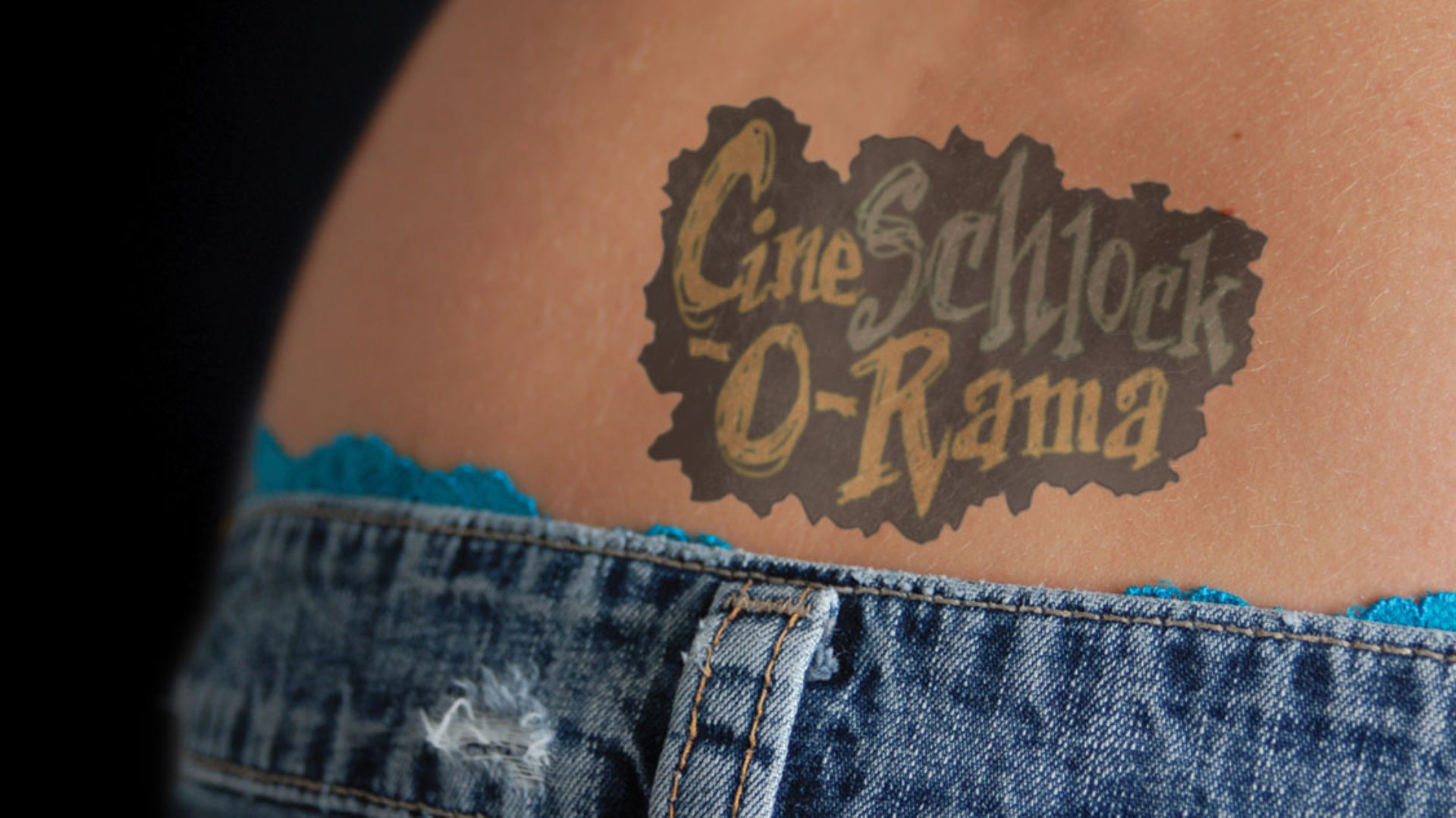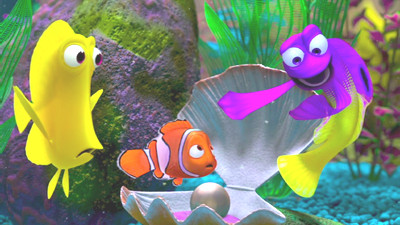
Little fish, Big fish
November 4, 2003
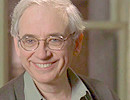 Chances are you know Austin Pendleton even if you think you don’t. The bespectacled character actor’s slight frame, toothy grin and nervous stammer have endeared him as a film and television fixture for more than 30 years now. He’s worked alongside everyone from Orson Welles to Shirley MacLaine to Kermit the Frog to the cellmates of "Oz." Most recently, Mr. Pendleton shared an aquarium with the namesake of Finding Nemo, and fortunately for yours truly, the promotion of Pixar’s two-disc ode to their latest triumph offered a can’t-miss opportunity to interface with another of my undersung screen idols. In the following conversation, Austin offers his typically charming insights on character acting, why he thinks Russell Crowe is really swell, his vocal acrobatics whilst making Nemo and flashes his wicked wit in the face of unexpected interview shenanigans …
Chances are you know Austin Pendleton even if you think you don’t. The bespectacled character actor’s slight frame, toothy grin and nervous stammer have endeared him as a film and television fixture for more than 30 years now. He’s worked alongside everyone from Orson Welles to Shirley MacLaine to Kermit the Frog to the cellmates of "Oz." Most recently, Mr. Pendleton shared an aquarium with the namesake of Finding Nemo, and fortunately for yours truly, the promotion of Pixar’s two-disc ode to their latest triumph offered a can’t-miss opportunity to interface with another of my undersung screen idols. In the following conversation, Austin offers his typically charming insights on character acting, why he thinks Russell Crowe is really swell, his vocal acrobatics whilst making Nemo and flashes his wicked wit in the face of unexpected interview shenanigans …
You’ve carved a wonderfully quirky niche as a character actor and have become one of those faces and voices that, when you pop up on screen, always offers something interesting to the proceedings.
Oh, thank you!
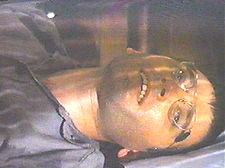 I especially love your "Mad Dog" Williams in The Front Page where Jack Lemmon hides you in a roll top desk for most of the film. Even within a screwball comedy such as that, you consistently manage to avoid straying into a caricature or cartoon. Is that a trained skill or something that’s just natural to you?
I especially love your "Mad Dog" Williams in The Front Page where Jack Lemmon hides you in a roll top desk for most of the film. Even within a screwball comedy such as that, you consistently manage to avoid straying into a caricature or cartoon. Is that a trained skill or something that’s just natural to you?
Two things had to do with that. First of all, it was directed by Billy Wilder, and he was very anxious that I not do it that way — right from the first scene that I shot. He was so sweet, he said, "I do not want to offend you by printing that take you just did." [Laughs.] "I would hate to do that to your reputation." With humor like that, he would keep me in check. "I have to believe you," he’d say. So, after the first two or three scenes we shot, I began to see what he wanted. There are a whole lot of other directors who would’ve even encouraged it to be a cartoon, but he was very anxious that it be kept pure. Then, also, acting teachers like Uda Hagen always emphasized avoiding the cartoon or caricature of something. So it’s from those two places, actually.
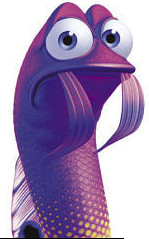 Although now you ARE a cartoon in Finding Nemo as the exuberantly germ-phobic Gurgle.
Although now you ARE a cartoon in Finding Nemo as the exuberantly germ-phobic Gurgle.
Oh, I’m so glad I’m in that movie! I was just talking to somebody about it, actually, and he was saying that it’s held together by a very strong story. You really get emotionally involved in it. All the wit and invention of it all hangs around the story. I haven’t been that emotionally involved in a movie in a couple of years! [Laughs.] They’re very good at involving the hearts of audiences at Pixar.
How difficult was it for you to have only your voice to work with?
Very hard. Like pole vaulting without having a chance to run. Particularly, because you are not in the room with any other actor. So it isn’t like you’re playing a scene with someone. They put sheets of paper on a stand, which have all the lines you speak in sequence and you take it a line at a time. You say each line four or five times until you have it the way that they want it. It’s totally out of any context and it’s not produced out of anything any other actor is doing. It’s really very hard. For a week or so after I did it, I felt I’d slightly injured my voice, because you have to push a lot of it to get to the heights they want. You wouldn’t have to push it if you were playing it in a scene with other people. It would be produced more spontaneously than that.
Is it something that you would do again?
Oh, sure! It was the first one of those that I had ever done, and so far, the only one, but yeah, I would. If the material was that good. I thought Ellen DeGeneres was brilliant [as Dory]. She’s wonderful. It’s an odd thing to say, but she’s a real human being in it.
Any idea what kind of fish Gurgle is?
No. I guess you could say I didn’t completely research the character. [Laughs.]
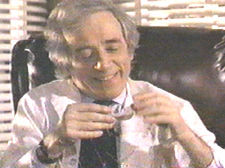 In something like My Boyfriend’s Back where you punch in and out of a movie, how conscious are you of making a mark with the audience?
In something like My Boyfriend’s Back where you punch in and out of a movie, how conscious are you of making a mark with the audience?
Well, you’re not really. At least I’m not. I remember on that particular film, on the first night we were going to the set for an all-night shoot, I was in the car with Bob Balaban who was directing it. I was saying, "God, in an hour, I’m going to be putting down a performance on film, for the ages, and we haven’t rehearsed it or anything!" [Laughs.] It’s the strangest feeling! You get so concentrated on simply trying to bring your own part to life. Also, you have no control over what happens with a final film. I’ve pored so much work into some films where the key scenes have then been cut, so you just don’t think: "Am I going to make my mark or not?"
Was that little gag of your talking into the zombie kid’s dismembered ear an improvisation?
No, actually, that was scripted. I’ve hardly ever done any improving on film except in Amistad. I had kind of a goofy day with Steven Spielberg on that, because the part was nonexistent. He said, "Let’s just play around with this." I think that’s the only time I can remember.
You also have a rich history in stage work. Directing. Playwriting. Steppenwolf ensemble member. Do you favor theater over film work?
The first few films I did, I was just wretchedly unhappy, because I’d already done a few years of theater work before my first film. I found the whole process of film was really, really frightening to me. I just couldn’t figure out how to do it. But then, over the years, I’ve gradually gotten used to it. Now I sort of like them equally. If I had to pick
one, and you removed all the other considerations, the money and all that stuff, I would pick the theater. But that’s because that’s where I come from and where I still am. I feel more secure in it. But there are things about film that you really treasure. You get to do take after take until you get it right. That doesn’t happen in the theater. [Laughs.] There’s a cocoon of a film set which can be kind of terrific.
I really enjoyed The 4th Floor, a picture you did recently with Juliette Lewis. I love how you were so cast against type.
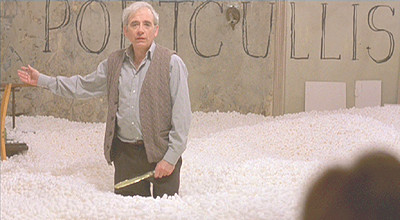
Oh, that’s so funny that you picked that up. At the first read-through around the table, there were quirky little things in the script that were funny and everybody would laugh, but afterwards, I went up to the director and said, "You know what, I would love it if we took a lot of that stuff out." He said, "Really? I thought that’s what you did?" I said, "That’s the whole problem! I would love to do without that." He said, "Great! We’ll do it!" In Guarding Tess, I had that big, long harrowing scene in the hospital room and the director had that one joke in it. Yet, that’s all anyone remembers from that scene! I was still sort of haunted by that when we did The 4th Floor. I said, "Why don’t we try to do this without that?" So many of the directors that I’ve worked with would’ve said at that point, "Come on! Why do you think we cast you!?!" But Josh Klausner, who was also the writer, immediately said "Terrific!" So, there were things that he gave up for that idea. He just eliminated them all and I’m so grateful.
That’s likely what makes the little things you DID do so appealing. Particularly, at the end of your character’s introduction to Lewis, where you sort of fidget for an extra beat or two of awkward silence. It immediately makes Mr. Collins endearing and invests us in the end of the movie when we realize: "This guy’s NUTS!"
He’s not a nice person. [Laughs.]
I guess you don’t look at packing peanuts in quite the same way anymore?
Right! Exactly. Shooting in that room full of them took all night. Then we had to loop the whole scene, because those things also made a lot of noise. That took hours and hours and hours. But, you know, it was worth it.
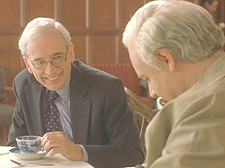 I may be straying into James Lipton territory here, but it’s said a huge part of acting is listening, and a prime example would be your tea scene with Russell Crowe in A Beautiful Mind.
I may be straying into James Lipton territory here, but it’s said a huge part of acting is listening, and a prime example would be your tea scene with Russell Crowe in A Beautiful Mind.
That man is extraordinary. That actor is just extraordinary! If you can’t listen to him, you can’t listen to anybody. Furthermore, we didn’t get to the angle on me until almost midnight. First we shot the scene on Russell Crowe about 6 o’clock in the evening and then, instead of turning around right on to me, we did the whole sequence of the pens being put on the table, which took hours. It was shot from every conceivable angle. Every different actor who brought a pen had to be shot. It was shot from overhead. Here and there. And this is a day that began at 6 o’clock that morning. So, finally, they brought the camera around to me at almost midnight and I was thinking, "I don’t know how to do this now. I can’t do it. I’m tired. I’ve forgotten completely what Russell said." But Russell sat off camera and played the scene as fully as he’d played it six hours before. It was incredible. I’ve never seen an actor do that. So all I had to do is hang out, do you know what I mean? And respond to him. I was thinking, "How can I do this!? How can I do this!?," and in effect, he did it for me. He’s very compelling to listen to. There are some actors where it’s hard to listen to them. Your mind literally wanders. [Laughs.]
Oh, you can’t say something like that and not give me an example!
It sounds like I’m being evasive, but they aren’t actors you’d have ever heard of. But every once and awhile, I’m in a play and you just have to think about other things while they’re talking, because you don’t believe a word they’re saying.
I understand you went to Yale?
As an undergraduate. I didn’t ever go to the drama school.
You weren’t a Bonesman were you?
No, I was the other one, Scroll and Key.
Well, I’d like to impose on your collegiate pride a little bit. Ten years ago, I did an interview with a Harvard man, Conan O’Brien, and I thought it might be amusing to conclude by asking you some of the same questions posed when he’d first taken the "Late Night" reigns.
Would you like to go on record with any wild threats of kicking someone’s ass?
Would I like to go on record with any wild threats of kicking someone’s ass!?! [Laughs.] NO!!! No, I wouldn’t!
Is it true that your sidekick Andy is heavily sedated before the show.
My sidekick Andy? [Laughs.] Every week!
Is it true that you’re still getting Letterman’s mail?
Yeah, and it has to stop.
Do you suffer from dizzy spells, ringing of the ears or hot flashes?
All of the above.
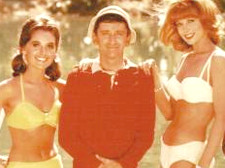 Now this may be of a different generation, but who turns you on more, Ginger or Mary Ann?
Now this may be of a different generation, but who turns you on more, Ginger or Mary Ann?
What!?!
They’re two characters from "Gilligan’s Island."
I’ve never once watched Gilligan’s Island. But I’ll say Ginger!
Well done. She was the movie star. OK, what frightens you?
Uh, well, Ginger and Mary Ann. [Laughs.]
What makes you laugh?
Ginger and Mary Ann.
You’re doing very well at this. Let’s wrap up with some free associations — Power.
A "Power Bar" is what comes to me.
Love.
Sex.
Guilt.
Sex. [Laughs.]
Mango.
Sex! Yeah.
Can I tell people that we’re pals?
Yes!
Alright! This has been a real treat. You’ve been very gracious and just how I’d expected you’d be. Thanks for your time today.
Well, thank you! Call me up if you’re ever in New York!

 Chances are you know Austin Pendleton even if you think you don’t. The bespectacled character actor’s slight frame, toothy grin and nervous stammer have endeared him as a film and television fixture for more than 30 years now. He’s worked alongside everyone from Orson Welles to Shirley MacLaine to Kermit the Frog to the cellmates of "Oz." Most recently, Mr. Pendleton shared an aquarium with the namesake of Finding Nemo, and fortunately for yours truly, the promotion of Pixar’s two-disc ode to their latest triumph offered a can’t-miss opportunity to interface with another of my undersung screen idols. In the following conversation, Austin offers his typically charming insights on character acting, why he thinks Russell Crowe is really swell, his vocal acrobatics whilst making Nemo and flashes his wicked wit in the face of unexpected interview shenanigans …
Chances are you know Austin Pendleton even if you think you don’t. The bespectacled character actor’s slight frame, toothy grin and nervous stammer have endeared him as a film and television fixture for more than 30 years now. He’s worked alongside everyone from Orson Welles to Shirley MacLaine to Kermit the Frog to the cellmates of "Oz." Most recently, Mr. Pendleton shared an aquarium with the namesake of Finding Nemo, and fortunately for yours truly, the promotion of Pixar’s two-disc ode to their latest triumph offered a can’t-miss opportunity to interface with another of my undersung screen idols. In the following conversation, Austin offers his typically charming insights on character acting, why he thinks Russell Crowe is really swell, his vocal acrobatics whilst making Nemo and flashes his wicked wit in the face of unexpected interview shenanigans … I especially love your "Mad Dog" Williams in The Front Page where Jack Lemmon hides you in a roll top desk for most of the film. Even within a screwball comedy such as that, you consistently manage to avoid straying into a caricature or cartoon. Is that a trained skill or something that’s just natural to you?
I especially love your "Mad Dog" Williams in The Front Page where Jack Lemmon hides you in a roll top desk for most of the film. Even within a screwball comedy such as that, you consistently manage to avoid straying into a caricature or cartoon. Is that a trained skill or something that’s just natural to you? Although now you ARE a cartoon in Finding Nemo as the exuberantly germ-phobic Gurgle.
Although now you ARE a cartoon in Finding Nemo as the exuberantly germ-phobic Gurgle. In something like My Boyfriend’s Back where you punch in and out of a movie, how conscious are you of making a mark with the audience?
In something like My Boyfriend’s Back where you punch in and out of a movie, how conscious are you of making a mark with the audience?
 I may be straying into James Lipton territory here, but it’s said a huge part of acting is listening, and a prime example would be your tea scene with Russell Crowe in A Beautiful Mind.
I may be straying into James Lipton territory here, but it’s said a huge part of acting is listening, and a prime example would be your tea scene with Russell Crowe in A Beautiful Mind.  Now this may be of a different generation, but who turns you on more, Ginger or Mary Ann?
Now this may be of a different generation, but who turns you on more, Ginger or Mary Ann?
